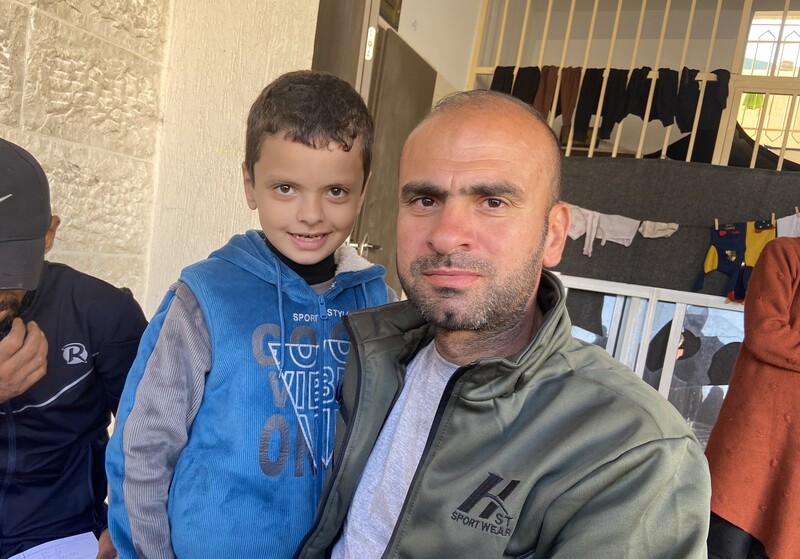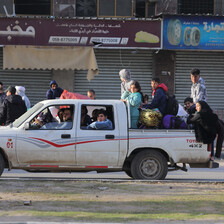The Electronic Intifada 4 December 2023

Once imprisoned by Israel, Muhammad al-Dirawi feared that Israel would arrest him as he fled south with his family along the “safe corridor.”
Muhammad al-Dirawi knows what hell on earth looks like.
He had endured 11 years of deprivation while imprisoned in Israel. When he was released in 2011 during a prisoner exchange deal, he returned home to Gaza and started his life anew.
He married and had two sons, who are now aged 8 and 11. The family settled down in the Gaza City neighborhood of Tel al-Hawa.
But the relative normalcy of his life outside prison was short-lived.
On 13 October, when the Israeli military first ordered northern Gaza residents to evacuate southward, al-Dirawi’s life again turned hellish.
The period following the evacuation order was marked by relentless Israeli aerial bombardments.
“There were nonstop airstrikes,” al-Dirawi said. “I couldn’t believe it. All the towers of Tel al-Hawa were either leveled or devastated.”
Al-Dirawi’s home was damaged by the airstrikes during the second week of the war. He took shelter with his family at al-Shifa hospital, thinking it would be safer than home.
“I thought the hospital was the safest place to go to,” he said. “No way it would be attacked. And if it was, the whole world would interfere.”
At al-Shifa, his wife and youngest son stayed in one area of the hospital, while he and his older son took shelter in the area near the morgue. Yet the area was under constant Israeli attack.
Al-Dirawi described the Israeli airstrikes as severe, creating what Palestinians in Gaza call firebelts, or relentless periods of bombardment.
“When I saw the bombardment intensify at al-Shifa hospital, I was really afraid for my children’s lives and my wife’s life, and I said, ‘That’s it.’”
The al-Dirawi family moved farther south, seeking an escape from Israeli attacks. On the way, they sheltered at a school next to al-Yarmouk playground, but Israel was bombing that area too.
They began walking again, until they were picked up by a donkey-pulled cart that took them to the Kuwaiti intersection in Gaza.
They were nearing the so-called safe corridor, which the Israeli army said would allow safe passage to the south.
“I asked my wife to go first with our two children,” he said. “She was afraid to leave me. I had heard many rumors that they picked up some people along the way, and as a released prisoner, I was afraid they might capture me and send me to prison again.”
Death in every direction
Along the “safe corridor,” the family saw corpses and the remains of donkeys and horses covered in flies next to the road. The route smelled of death.
Al-Dirawi’s children were horrified as they saw Israeli army soldiers for the first time.
“In the safe corridor, anything that moved was targeted,” al-Dirawi said. “They allowed some people to stop for a while, and then they asked them to head back to Gaza City.”
Al-Dirawi said he saw injured children along the route and that many elderly people were struggling with the long walk south.
“One woman asked me how much longer we had to go. She was exhausted from walking. I was going to tell her it was still a long way, but I realized her sons were telling her it wasn’t much longer to motivate her to keep going.”
During the walk, no one was allowed to use their phones: “If anyone, God forbid, tried to use their phone, they would be immediately shot.”
Israeli tanks and bulldozers created sandstorms along the way, making it difficult to see the road.
“We had to walk quickly on the right side. Whenever [the Israeli army] stopped some people, they would … take their belongings. If something fell down and you tried to pick it up, you would be shot immediately.”
The al-Dirawi family is now sheltering in the library of a school in Rafah – Gaza’s southernmost city – along with several other families. Their living spaces are divided by thin plastic sheets.
His sons have nightmares about the horrors they saw on the road south.
One of them asked him, “Will the dead people return back? Will their mothers come and take them again out of the safe corridor?”
Desperate journey
A couple of months before October 2023, Faras Arafat, 21, had just completed his nursing residency in Gaza.
As soon as the war started, Gaza’s health ministry issued a call for medics to immediately begin work, and Arafat wasted no time in responding.
“I used to work for 24 hours straight,” he said.
Near al-Shifa hospital, before the Israeli raid on the hospital, the Israeli bombardments were heavy.
“There was an urgent need for food and water for the patients, but we had none to offer,” he said.
Some people managed to bring in food, and they shared what they had with the medics. Arafat had bought some dates at the beginning of the war to provide himself with energy.
However, there came a day when there was no food at all, and he had to rely on sugar water to sustain himself.
Thousands of people had sought shelter at al-Shifa hospital and on its grounds.
Arafat’s family live in al-Zaytoun, an area on the outskirts of Gaza City. Yet they sought refuge in the south after the sixth day of the war.
“I accompanied them and spent two days with them. Then, I returned to the hospital to continue my work,” Arafat said.
“There was a firebelt every day,” he said, in reference to a continuous Israeli bombardment. “But as medical professionals, we had a duty to alleviate people’s suffering. We kept reassuring [patients and those taking shelter] not to worry and that everything would be OK.”
Arafat stayed at al-Shifa because he believed that it was off-limits to Israeli attack.
Yet, as the bombardments intensified, more people fled the hospital seeking safety. Soon, the medical staff joined the exodus and headed south.
Those with leg injuries had to get help from others to walk.
“I was torn between leaving and staying,” Arafat said. “I felt that if I stayed, I could lose my life.”
Arafat evacuated the hospital when it became clear that an Israeli attack was imminent. He proceeded along the “safe corridor,” where he encountered army checkpoints.
Some people were interrogated there and then allowed to continue on.
“My family was deeply concerned,” he said.
At one such checkpoint, Arafat witnessed an elderly man in a wheelchair being pushed by his nephew. The soldiers forced the nephew to abandon his uncle.
Desperate to escape, crowds of people fleeing south pushed themselves into the checkpoint areas, which Arafat estimated measured 1.5 by 4 meters.
“We just looked at each other in disbelief,” he said.
The Israeli army forced people to leave their belongings behind, including blankets and warm clothing that many had brought to face winter.
Arafat found temporary refuge at a friend’s house, where 28 people were crammed together.
He considers himself lucky to have made it out of the safe corridor alive.
Ghada Abed is a journalist based in Gaza.





